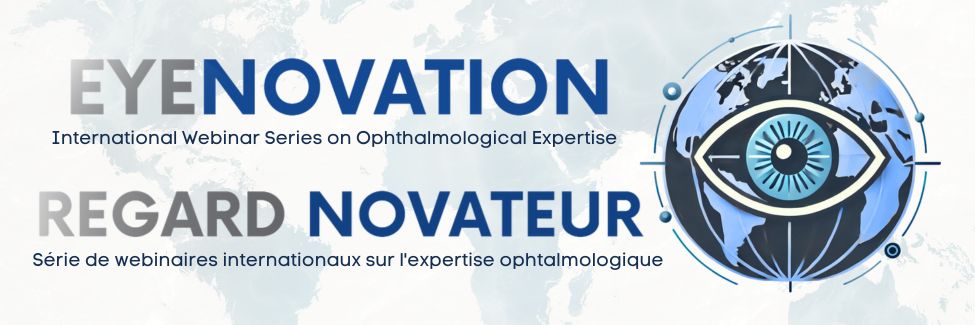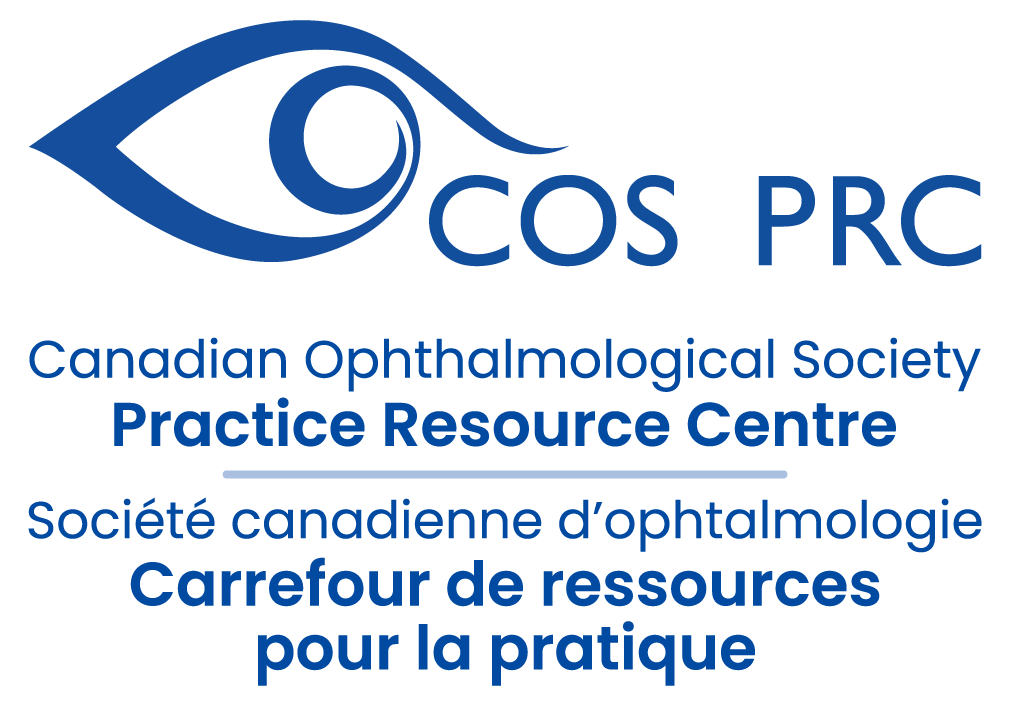Ocular Mucous Membrane Pemphigoid Course
Location: Virtual – access the course HERE
Mucous membrane pemphigoid (MMP) is a cicatricial autoimmune disease primarily affecting mucous membranes of the conjunctiva, oral cavity, nasopharynx, oesophagus and genitals. Ocular involvement occurs in approximately 80% of cases, highlighting the importance of early diagnosis to prevent irreversible damage and potential blindness.
Authors: Melissa Lu (MD), Fady Sedarous (MD, FRCSC), Mona Harissi-Dagher (MD, FRCSC)
Learning objectives: Upon completion of this module, learners will gain a comprehensive understanding of the pathophysiology, clinical signs, diagnostic and treatment principles of ocular mucous membrane pemphigoid (OMMP), enabling them to apply this knowledge in clinical practice.
Target audience: Ophthalmology residents and ophthalmologists.
DOVS CORNEA ROUNDS – no rounds for this week
Date:
Time:
Title:
Speaker:
Zoom Link to Register:
After registering, you will receive a confirmation email containing information about joining the webinar.
The VPP Grand Rounds Local and Visiting Professor Program is a self-approved group learning activity (Section 1) as defined by the Maintenance of Certification program of The Royal College of Physicians and Surgeons of Canada. You will be able to claim 1 credit for this round.
DOVS GRAND ROUNDS – no rounds for this week
Date:
Time:
Title:
Speaker:
Zoom link:
After registering, you will receive a confirmation email containing information about joining the webinar.
Objectives:
The VPP Grand Rounds Local and Visiting Professor Program is a self-approved group learning activity (Section 1) as defined by the Maintenance of Certification program of The Royal College of Physicians and Surgeons of Canada. You will be able to claim 1 credit for this round.
DOVS CORNEA ROUNDS – No Sutures, No worries: Mastering Flanged Scleral Fixation – VIA ZOOM
Date: Thursday, March 27th, 2025
Time: 5:00 – 6:00 PM (Eastern Standard Time)
Title: No Sutures, No worries: Mastering Flanged Scleral Fixation
Speaker: Professor Adi Einan Lifshitz
Zoom Link: Register in advance for this webinar
After registering, you will receive a confirmation email containing information about joining the webinar.
Objectives:
1. Understand the Principles and Indications for the Flange scleral fixation technique Master the Surgical Steps;
2. Recognize Complications, Postoperative Care and tips for success.
The VPP Grand Rounds Local and Visiting Professor Program is a self-approved group learning activity (Section 1) as defined by the Maintenance of Certification program of The Royal College of Physicians and Surgeons of Canada. You will be able to claim 1 credit for this round.
EyeNovation: Unveiling the pachychoroid disease spectrum: a deep dive into central serous chorioretinopathy and polypoidal choroidal vasculopathy

Join us for our next webinar in our EyeNovation: International Webinar Series for Ophthalmic Expertise!
“Unveiling the pachychoroid disease spectrum: a deep dive into central serous chorioretinopathy and polypoidal choroidal vasculopathy”, presented by Dr. Angie H.C. Fong, University of Hong Kong school of Clinical Medicine.
This engaging session exploring the evolving understanding of the pachychoroid disease spectrum (PDS) with a focus on central serous chorioretinopathy (CSCR) and polypoidal choroidal vasculopathy (PCV). This webinar will provide an in-depth review of pathogenesis, recent clinical trials, and emerging management strategies. Participants will also gain insights into the incidence and risk factors for PDS progression based on natural observation studies. This webinar will take place on Tuesday, March 25th from 7:00 – 8:00 PM ET.

Dr. Fong joined the Department of Ophthalmology, School of Clinical Medicine in February 2023 as Clinical Associate Professor of Practice. She leads the vitreoretinal service at the Queen Mary Hospital & Grantham Hospital where she is an honorary consultant. She is also an honorary consultant of the United Christian Hospital. Dr. Fong graduated from the University of Hong Kong with distinction in medicine & was the recipient of the Medic ’67 Gold Medal in Clinical Medicine for being top of her class. She completed her Masters in Public Health degree from the School of Public Health in HKU with distinction & is an HKAM accredited specialist in Ophthalmology. Having been awarded the Ho Hung Chiu Medical Education Foundation Scholarship, she went on to further her training in both surgical & medical retina under Prof. Peter Stalmans in Belgium & the Will’s eye hospital in the US. Her research interests include vitreoretinal surgeries, retinal imaging, macular & choroidal diseases, artificial intelligence & translational care. She was awarded 2 patents for her work on AI in OCT imaging in age related macular degeneration. She has 50+ publications in international peer reviewed journals & has co-authored a textbook in OCT imaging in central serous chorioretinopathy. She participates in major clinical trials with international sites in both the HKU & CUHK clinical trials centres.
Learning objectives
At the end of this session, participants will be able to:
- Assess the evolution and current understanding of the pathogenesis of pachychoroid disease spectrum (PDS) disorders.
- Integrate the diagnosis and management of central serous chorioretinopathy (CSCR) and polypoidal choroidal vasculopathy (PCV) by analyzing recent clinical trials and management strategies.
- Describe the incidence and risk factors for PDS progression in a natural observation study.
If you missed this webinar, not to worry! The recording is available below:
Understanding Uveal Melanoma: A Rare but Serious Eye Cancer
Submitted by: Joshua Huang
Reviewed and approved by: Dr. Marie-Josée Aubin, Dr. Anne Xuan-Lan Nguyen
What is Uveal Melanoma?
Uveal melanoma (commonly referred to as ‘intraocular melanoma’) encompasses melanomas that arise in the iris, ciliary body, and choroid, all of which make up the uvea or uveal tract. The uvea is the second most common location for the development of melanoma, after the skin, and uveal melanoma is the most common primary intraocular cancer in adults. Although it is rare (it affects 5 adults out of 1 million people each year), it can lead to vision loss, eye loss and even death.
Symptoms
Although most patients are asymptomatic, symptoms can include:
- Blurry vision
- Flashes or photopsia
- Floaters or spots in your vision
- Visual field loss
- Visible dark spot on your iris
- Pain (uncommon)
Risk Factors
- Older individuals (peak age of 70)
- Existing skin moles,iris or choroidal nevi
- Fair skin and light eye colour
- Skin that burns easily with an inability to tan
- Arc welding
- Indoor suntan bed use
- Note: Although sunlight is a risk factor for cancers of the skin and the ocular surface, its association with uveal melanoma is controversial and has not been established
Diagnosis
- Complete eye examination, including a dilated view of the back of the eye (fundus)
- Ocular ultrasonography (B-scan)
Treatment Options
- Based on size and location
- Includes observation, resection, radiation therapy, or enucleation
- Immunotherapy if the cancer has spread (metastasis)
Conclusion
Despite advancing uveal melanoma treatment modalities, there has been no change in survival over the last 50 years. Therefore, awareness and prevention are critical to improving outcomes. talk to your doctor or eye care provider for a complete annual eye exam.
Tuesdays with the Titans: Ophthalmology Update & Review Lecture Series
The University of Alberta and ACUPO are eager to present: Tuesdays with the Titans: Ophthalmology Update and Review Lecture Series. This is a series of webinars that will be hosted on Tuesday evenings from 5:30 – 7:30 PM, MST. Learners are expected to:
- Apply the latest updates in comprehensive ophthalmology
- Review the 10 ophthalmic subspecialties prior to OKAP and the Royal College written exams.
The schedule is as follows:
| Date | Speaker | Topic | University |
| January 7th, 2025 | Alex Kaplan | Uveitis | University of Toronto |
| January 14th, 2025 | Michel Belliveau | Oculoplastics | University of Ottawa, Queens University |
| January 21st, 2025 | Ike Ahmed | Cataract | University of Toronto, University of Utah |
| January 28th, 2025 | Kamiar Mireskandari and Crystal Cheung | Pediatrics | University of Toronto |
| February 4th, 2025 | James Farmer | Pathology | University of Ottawa, Queens University |
| February 11th, 2025 | Delan Jinapraya | Glaucoma | Queens University |
| February 18th, 2025 | Hall Chew | Cornea | University of British Columbia |
| February 25th, 2025 | Paul Grewal | Retina | University of Alberta |
| March 4th, 2025 | Rahul Sharma and Claire Sheldon | Neuro-Ophthalmology | University of Toronto, University of British Columbia |
| March 11th, 2025 | Michael Wan | Optics | University of Toronto |
These webinars are eligible for MOC Section 1 Credits. Please contact [email protected] for registration information.
Maximize Your MOC Credits

To ensure you make the most of your learning activities, the Canadian Ophthalmological Society has curated some resources to help you maximize your MOC credits.
Discover how to make the most of your CPD activities and maximize your MOC credits throughout the year. This interactive mini-module guides you through a practical case study featuring Dr. Smith, who demonstrates how to turn diverse learning activities into optimal credit opportunities.
For the best user experience, we recommend accessing the course on a computer using a web browser. However, the module can still be accessed on a mobile device.
Diabetes Awareness Month
November is Diabetes Awareness Month, a time to highlight the critical role ophthalmologists play in managing diabetic eye disease. To support your practice, the Practice Resource Centre has compiled a curated list of insightful journal articles, clinical guidelines, and patient resources focused on diabetic retinopathy and related complications. Explore these valuable tools to stay informed and enhance patient care.
For Guidelines:
Diabetes Canada – Diabetic Retinopathy Guidelines
American Academy of Ophthalmology – Guidelines on Diabetic Eye Care
For Articles:
Retinal Physician – The Evolution of Clinical Trial Endpoints for Diabetic Retinopathy
JMIR Diabetes – Implementation of Artificial Intelligence–Based Diabetic Retinopathy Screening in a Tertiary Care Hospital in Quebec: Prospective Validation Study
Canadian Journal of Ophthalmology – Spectral-domain OCT characteristics of intraretinal hyper-reflective foci associated with age-related macular degeneration and diabetic retinopathy
Canadian Journal of Ophthalmology – Long-term visual outcomes and fluid compartment changes in limited-early versus early response to anti-VEGF treatment for diabetic macular edema
Canadian Journal of Ophthalmology – https://www.canadianjournalofophthalmology.ca/article/S0008-4182(24)00173-X/abstract
For Consensus Statements:
Ophthalmology and Therapy – Diabetic Disease of the Eye in Canada: Consensus Statements from a Retina Specialist Working Group
For Correspondence:
Canadian Journal of Ophthalmology – Acute bilateral diabetic papillopathy in a child



